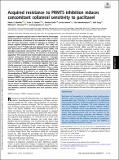Acquired resistance to PRMT5 inhibition induces concomitant collateral sensitivity to paclitaxel
Author(s)
Mueller, Helen S; Fowler, Colin E; Dalin, Simona; Moiso, Enrico; Udomlumleart, Tee; Garg, Salil; Hemann, Michael T; Lees, Jacqueline A; ... Show more Show less
DownloadPublished version (1.700Mb)
Publisher Policy
Publisher Policy
Article is made available in accordance with the publisher's policy and may be subject to US copyright law. Please refer to the publisher's site for terms of use.
Terms of use
Metadata
Show full item recordAbstract
<jats:title>Significance</jats:title>
<jats:p>
Resistance to therapeutics is a challenge when treating cancer patients. Cancer can become resistant to therapies in distinct, unpredictable ways. Therefore, it is important to understand how resistance occurs to enable development of second-line or combination treatment strategies. This study develops cells that are resistant to inhibitors of protein arginine methyltransferase 5 (PRMT5), which is up-regulated in many cancers and being targeted in current clinical trials. We show that resistant lung adenocarcinoma cells are now sensitive to the widely used chemotherapy, paclitaxel, and identify a single gene,
<jats:italic>Stmn2</jats:italic>
, that is responsible for both the resistance to inhibitors of PRMT5 and the collateral sensitivity to paclitaxel. Our data suggest that combined treatment with PRMT5 inhibitors and taxanes could be a success.
</jats:p>
Date issued
2021Department
Massachusetts Institute of Technology. Department of BiologyJournal
Proceedings of the National Academy of Sciences of the United States of America
Publisher
Proceedings of the National Academy of Sciences
Citation
Mueller, Helen S, Fowler, Colin E, Dalin, Simona, Moiso, Enrico, Udomlumleart, Tee et al. 2021. "Acquired resistance to PRMT5 inhibition induces concomitant collateral sensitivity to paclitaxel." Proceedings of the National Academy of Sciences of the United States of America, 118 (34).
Version: Final published version